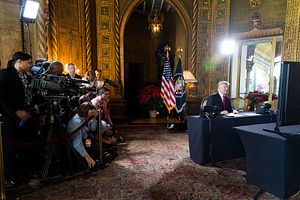As the Trump administration prepares for its mandatory military response to Syria’s latest poison gas attack against Syrian civilians, it is undoubtedly weighing not only its intended targets, but the reactions of the other players in the grisly strategic game.
Russia, Iran, the Islamic State, Turkey, the Kurds, the democratic anti-Assad forces, and the Assad regime itself, may find their fortunes in Syria dramatically changed by the punitive action President Donald Trump is contemplating in the name of the Syrian people and all humanity. Let us hope that will be the scope and long-term benefit of a well-planned campaign coordinated with Israel, France, the United Kingdom, and other nations committed to preventing the use of chemical weapons.
The risks of retaliation and escalation by one or more of the parties to the conflict should not be minimized. But neither should they be exaggerated nor allowed — again — to paralyze Western will. What is at stake is enforcement of universal humanitarian and existential norms invoking war crimes and crimes against humanity.
Rather than shying away from action that impacts Russia, Iran, and even peripherally Turkey, our NATO ally and sometimes adversary in Syria, Washington should impose a substantial price on any nations or parties complicit in Assad’s humanitarian outrages. It was a risk they knowingly took and should be deterred from ever taking again.
As the world awaits America’s response to this fundamental challenge to the international order, nations in East Asia are paying special attention because of the implications for looming crises in that region. China and North Korea, whose aggressive anti-Western policies are inextricably intertwined, watch to see how seriously they need to take Trump administration warnings about moves on the Korean Peninsula, the South and East China Seas, and Taiwan. (Trade is also a test of wills now, but only because of decades of Western passivity as China cynically exploited the world’s generous welcome to the international system.)
A year ago at Mar-a-Lago, the president used the occasion of an earlier Assad gas attack to deliver a message to visiting Chinese leader Xi Jinping. He sent threescore cruise missiles crashing into the Syrian airfield from which the crime was launched. The strike not only enforced the red line former President Barack Obama had drawn then backed away from, but served as an intended deterrent to future Assad behavior.
It also conveyed to Xi, as well as Kim Jong-un in North Korea, that this was an American president to be taken seriously on national security matters. But, eventually, within Syria — and in the thinking of its Russian and Iranian sponsors — that strike was interpreted as mostly symbolic, not unlike President Bill Clinton’s pinprick missile strikes on Iraq in 1998.
As for the one-off Syrian strike’s diminishing impact on Beijing and Pyongyang, it took a lot of tough talk from President Trump and increasing U.S. military preparations in the region to restore their concern that something kinetic might indeed be in the offing.
But now, after the Olympics cooling-off interlude, the approach of a Trump-Kim denuclearization meeting, and intensified presummit negotiations, the two communist nations may detect a slight faltering of American willingness to return to a confrontational posture. The eagerness of South Korean President Moon Jae-in for a peaceful diplomatic solution also contributes to a sense that America’s hands are at least partially tied. The recent downsizing of the U.S.-ROK joint military exercises has not gone unnoticed in Beijing and Pyongyang.
Just as the Trump administration faces a historic and potentially world-shaking challenge from the China-North Korea partnership, the Russia-Syria-Iran axis has thrown a new explosive curve-ball into the mix. A comprehensive response in Syria will dramatically affect the strategic dynamic not only in the Mideast but throughout East Asia.
Joseph Bosco is a former China country director in the office of the secretary of defense, 2005-2006.

































